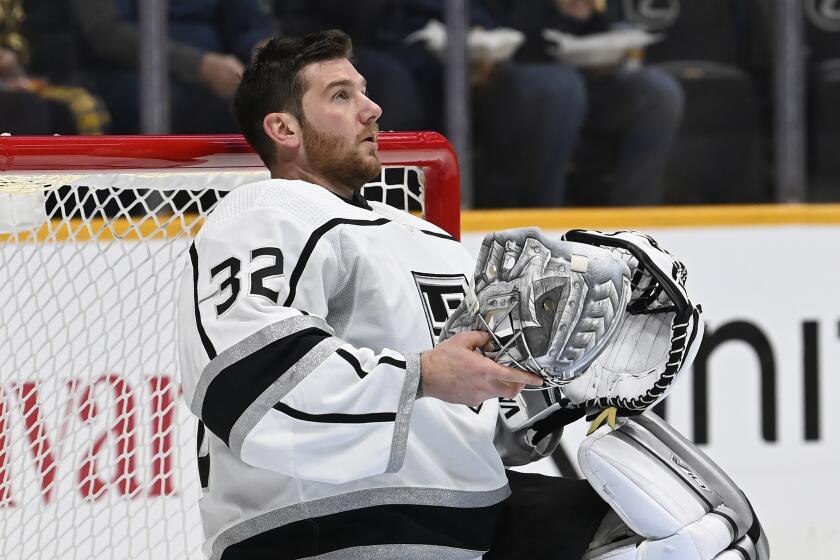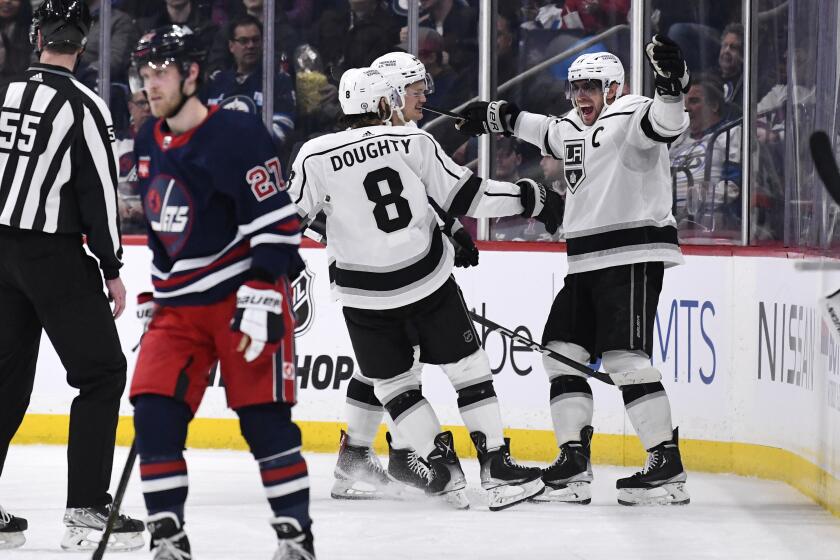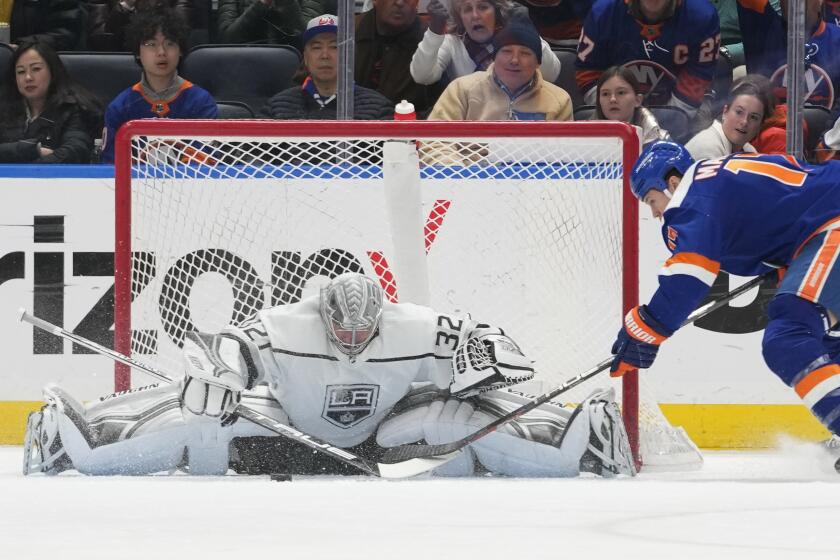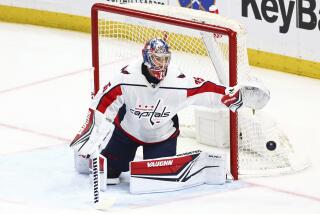Column: Kings use their heads over hearts in trading Jonathan Quick
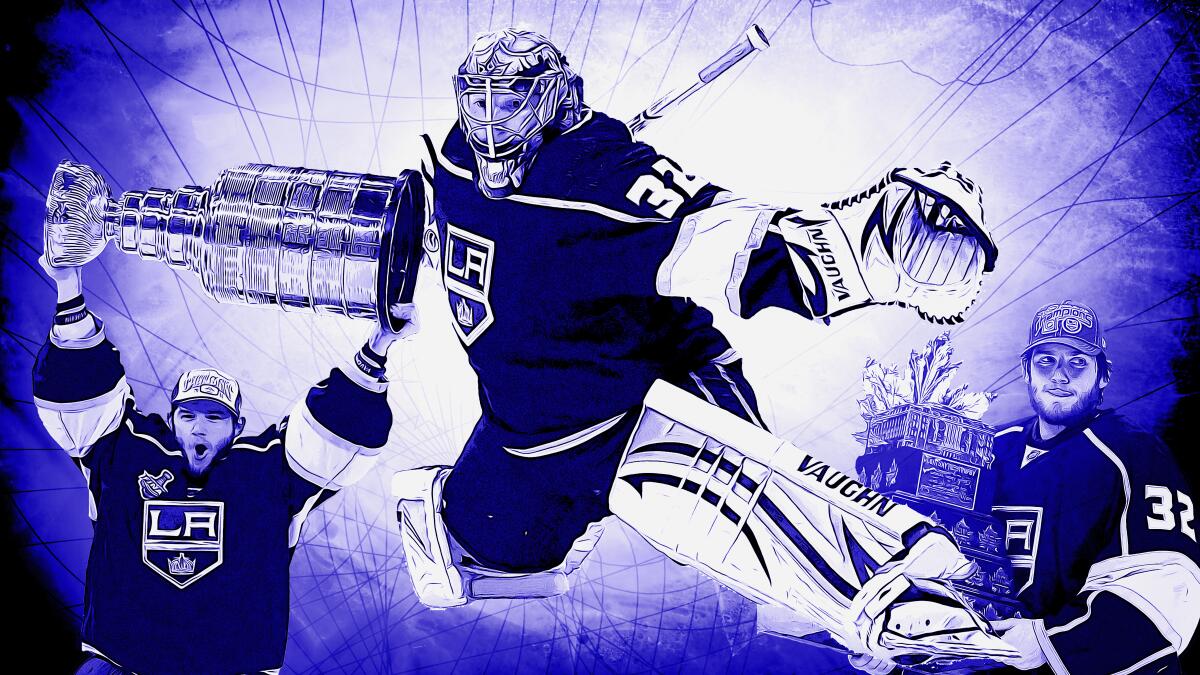
- Share via
Every now and then, goaltender Jonathan Quick would flash his glove or kick out his leg or repel an intruder from his crease with a feisty shove and it would feel like the Kings’ best years all over again.
But those moments recently had become all too rare for Quick, who was the most valuable player in the Kings’ surprisingly dominant 2012 Stanley Cup championship run and carried them through a 26-game playoff minefield to help them prevail again in 2014.
No athlete has ever defeated time and the indignities the passing years bring — slower reflexes, longer recovery periods, challengers who had a poster of you on the wall of their childhood bedroom. Even Quick, a Connecticut native who stands among the best Americans to wear the mask and pads of his stressful profession, couldn’t make time stand still. Nor could he pause it so he could be part of another championship push in the last season of his 10-year, $58-million contract.
A day after being traded from the Kings to Columbus, Jonathan Quick is flipped to the Vegas Golden Knights, who are battling L.A. for first place.
Still, there was a sad finality to the announcement Wednesday the Kings had traded Quick, a conditional 2023 first-round draft pick and a third-round pick in 2024 to the Columbus Blue Jackets for goaltender Joonas Korpisalo and defenseman Vladislav Gavrikov. The newcomers — each in the final season of his contract — were scheduled to meet the media Thursday morning, hours before the Kings face Montreal at Crypto.com Arena.
Korpisalo should bring stability to a team that has given up as many goals as it has scored. Gavrikov brings the potential of much-needed bite and, as a left-handed shooter, better lefty-righty balance on their defense pairs. “We felt that this type of move addressed the two situations that we felt needed to be addressed on the team,” general manager Rob Blake said.
This trade also represents another step toward closing the door on the team’s greatest era. Coming a few weeks after the Kings retired the jersey of Cup captain Dustin Brown and unveiled a statue of him, Quick’s departure is difficult to absorb on an emotional level.
“Jonathan Quick is the best goalie to ever play in this organization, let alone in the league, and he’s taken us, with a handful of players, the organization, to the highest level in two different times and throughout his career,” Blake said. “We were so thankful for what he’s been able to do for this organization, as a player, as a person, him and his family and his kids. We’re indebted to what he’s been able to do for us.”
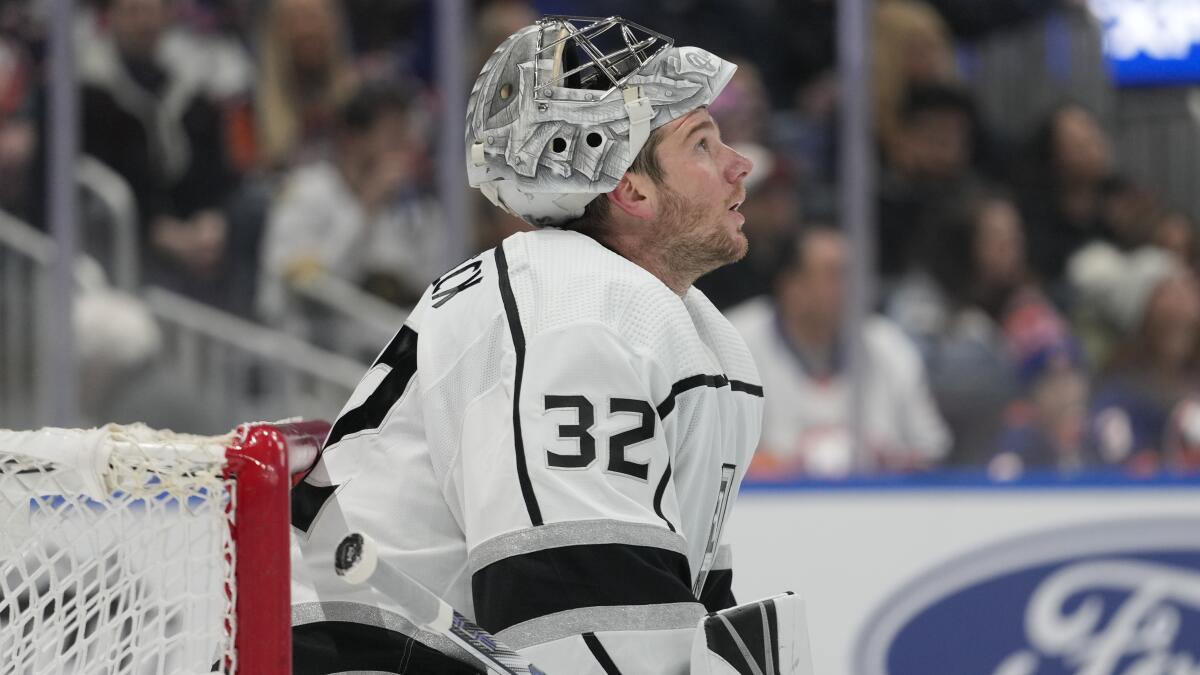
There’s no room for sentiment in business or in hockey, and it was painfully obvious that Quick, with a 3.50 goals-against average and .876 save percentage, had become slower and more vulnerable. His defense often did him few favors, but he didn’t intimidate shooters anymore and couldn’t make big saves when the situation demanded them. He was the franchise leader among goalies in games (743), wins (370) and shutouts (57), but at 37 he couldn’t lift the Kings back to the level he and they had once enjoyed. A man of few words and little regard for anything but winning, he must have hated that.
“Every year you come in, you want to win a Cup. If anyone has any other idea of what they want to do this year than that, then we don’t have it,” he told The Times in November. “Every day, you work towards being a playoff team. And when you become a playoff team, then you work towards winning 16 games. That’s the only reason to play this game, to be honest, so anything other than that is a disappointment.”
Blake conceded it was unfortunate he couldn’t deliver the news to Quick in person after the Kings’ 6-5 shootout victory at Winnipeg on Tuesday. Blake didn’t go on the trip, and when Hockey Night in Canada reporter Elliotte Friedman broke the news on Twitter, Blake couldn’t wait. He spoke to Quick by phone and separately to Drew Doughty and Anze Kopitar, now the last players left from the Cup teams. Were they shocked? Disappointed? “Both,” Blake said.
Anze Kopitar scored four goals in regulation and Adrian Kempe had the only score in the shootout as the Kings rallied to beat the Winnipeg Jets 6-5.
But if there’s ever going to be a third championship, Blake had to move on and improve the goaltending and defense. He had to make decisions based on reason, not on misty memories of triumphs in days gone by.
The conditional pick he traded will be a first-rounder if the Kings make the playoffs this season or second-round picks in 2023 and 2024 if they fall from the upper reaches of the West and out of the top eight. Blake has time to acquire another first-round pick before Friday’s noon Pacific time trade deadline, and more salary-cap flexibility to do it. He also could trade for a first-rounder after the season.
That the Kings are in contention despite inconsistency in goal and defensive lapses are reasons this trade made sense. Blake had upgraded the talent up front by signing Phillip Danault to a six-year, $33-million contract as a free agent in 2021 and he upgraded again last summer by trading for winger Kevin Fiala and signing him to a seven-year, $55.125-million contract. Fiala leads the team in scoring.
This deal was a reward for players’ resilience and insurance for playoff-untested goalie Pheonix Copley. Cal Petersen, who fumbled several chances to succeed Quick in the No. 1 job, remains in the minors following Blake’s misguided decision to sign him to a three-year, $15-million contract.
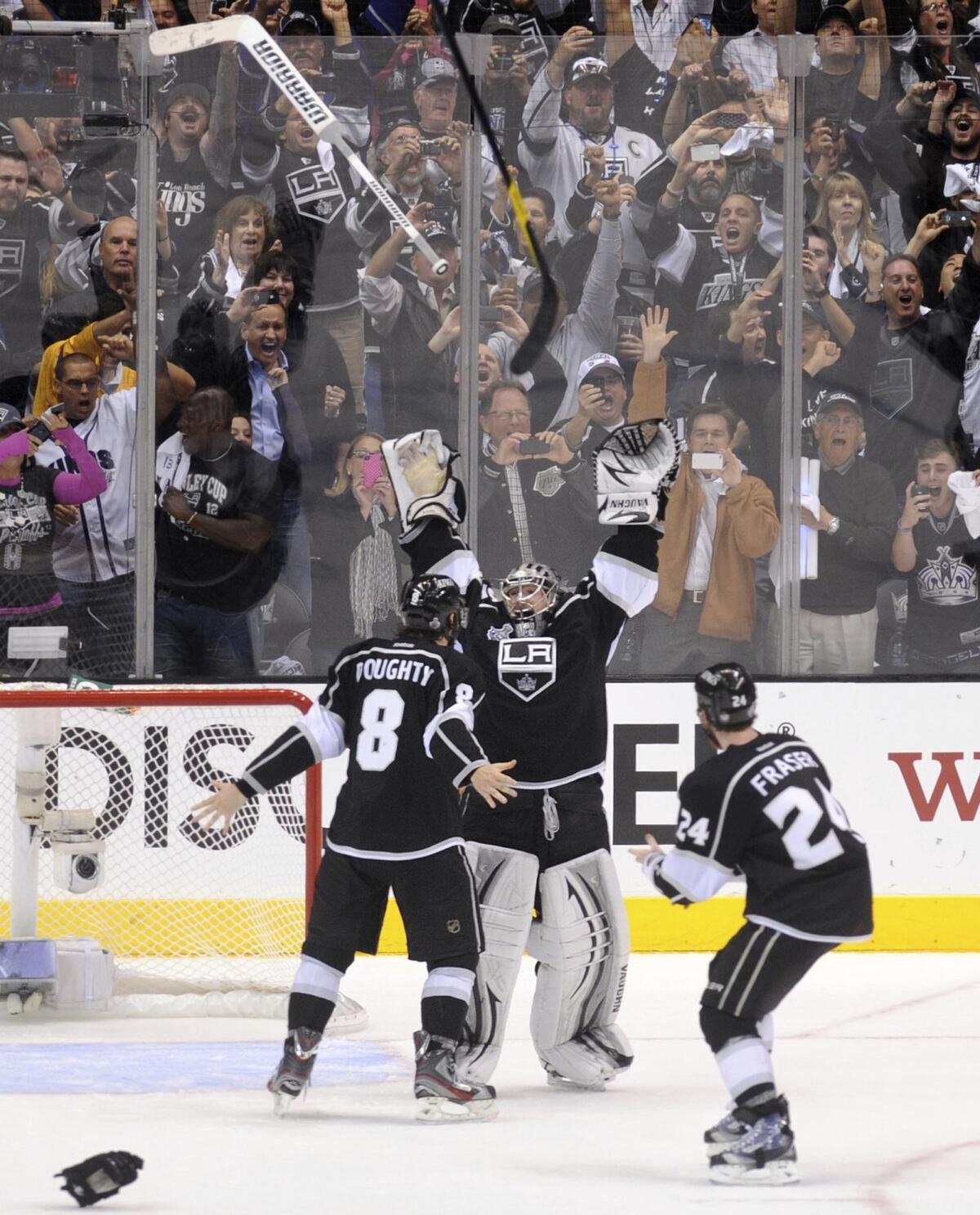
“I think the team directed us in that,” Blake said of upgrading their talent level.
The Kings had been connected to negotiations for prized Arizona defenseman Jakob Chychrun, but the Coyotes sent him to Ottawa for conditional first- and second-round picks this year and next and a second-round pick in 2026. Later Wednesday, Blake acquired the rights to University of Michigan goalie Erik Portillo from the Buffalo Sabres for a third-round pick in the 2023 draft.
In a bit of uncanny timing, news that Quick was about to be traded leaked out hours after the Chicago Blackhawks — who alternated Cup titles with the Kings in 2012-13-14-15 — traded franchise cornerstone Patrick Kane to the New York Rangers. Time marches on, here, there, and everywhere.
Jonathan Quick surpasses Tom Barrasso for third place in career victories by a U.S.-born goaltender in the Kings’ 3-2 win over the Islanders.
What’s sad is that Quick didn’t have a chance to say goodbye to fans who have watched him mature from a kid with dodgy work habits into a husband, father, playoff MVP and two-time winner of the Jennings Trophy as the goalie on the team that gave up the fewest goals. The Blue Jackets will be at Crypto.com Arena on March 16, but it’s possible they’ll flip Quick before then to a team that wants the locker-room presence of a Cup winner and can afford to keep him in a backup role. He might not return this season, but he won’t be forgotten here.
Someday, Quick’s jersey will be retired. A statue of him might be added alongside the likeness of Brown. He has earned those honors. But he couldn’t stop or pause time, and the Kings’ path back toward the top of the hockey world won’t include him. It’s sad, but true.
More to Read
Go beyond the scoreboard
Get the latest on L.A.'s teams in the daily Sports Report newsletter.
You may occasionally receive promotional content from the Los Angeles Times.

